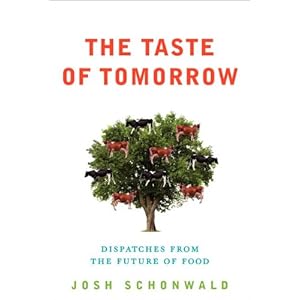I recently got my hands on a unique and somewhat odd foodie book: The Taste of Tomorrow.
Solidly humanitarian and an unabashed devotee of bagged
salad and pad thai, author Josh Schonwald brings a unique perspective to the
discussion of food. He starts with a specific question (what will
food look like in 2035) and keeps his lines of investigation narrow,
but in- depth (no attempt to discuss dairy, fruit or any any number
of other items at all).
Focusing on salad, fish, pseudo-meat
and the next big trend in ethnic food, he clearly writes from a
market-driven mindset. He's all about what your average (lazy)
American will find at their local restaurants and supermarkets and
why. His investigation leads him to places not often discussed in
foodie books – the labs in Holland where pseudo-meat is being grown
in petri dishes, the warehouse sized indoor, inland fish farms where
scientists and businessmen try to raise mostly unheard of fish
(cobia) that they hope will be the next salmon, and the lettuce
fields of California where giant Agra-business companies manipulate
GM plants to create the most disease resistant and travel friendly
hybrids.
I strongly disagree with most of Mr.
Schonwald's conclusions, and I wasn't consistently impressed with his
writing. None of his arguments were persuasive,
often because his research and logic were clearly lacking. (The
golden rice issue being a prime example. If you still think it is the
answer to global hunger, you obviously haven't researched the subject
very well.)
That
said, it was interesting to sneak a peak into the lesser-traveled
circles of food production that he selected, and helpful from a
whole- foodie standpoint to understand how people think when they're
championing GM foods and fake meat as a viable, beautiful future.

No comments:
Post a Comment